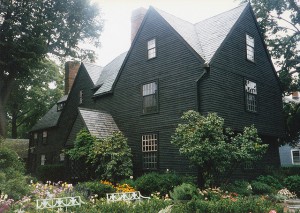 Young men and women of relatively high status, including the children of close relatives, passed through the households of the Winthrops and their friends: it was a rite of passage.
In the fall of 1638, Lucy (Winthrop) Downing invited her sister-in-law Margaret (Tyndal) Winthrop to visit the Downings in Salem, adding “I hear [their niece] Margaret Gostlin and my [stepdaughter] Nan is a cominge and not my youngest whoe I expected would be a mayds work, and now I shall be ouer mayded: I hear you want one: if you doe I should be glad she might serv you till either some of our children or seruants wear disposed of: she [Margaret?] doth all the worst work in her mothers howes and is very seruisable…”
Young men and women of relatively high status, including the children of close relatives, passed through the households of the Winthrops and their friends: it was a rite of passage.
In the fall of 1638, Lucy (Winthrop) Downing invited her sister-in-law Margaret (Tyndal) Winthrop to visit the Downings in Salem, adding “I hear [their niece] Margaret Gostlin and my [stepdaughter] Nan is a cominge and not my youngest whoe I expected would be a mayds work, and now I shall be ouer mayded: I hear you want one: if you doe I should be glad she might serv you till either some of our children or seruants wear disposed of: she [Margaret?] doth all the worst work in her mothers howes and is very seruisable…”
In the same period, Margaret Winthrop received an application from her stepson John2 Winthrop “in the behalfe of this mayd Sarah Wing whom in respect of hir great desire to serve you, and my owne apprehensions of hir fitnesse for your attendance, in [Margaret’s previous maid] Mary Cleers place, I make bould to commend to you, desiring you to make tryall of hir at least for a season. This I dare promise you in hir behalf, that you will find hir as absolutely, and humbly at your command as any that ever you could have.” (Winthrop Papers, Volume 4, pp. 63, 64, 68)
Not all maids were as “seruisable” as Lucy Downing’s or as fit as Sarah Wing. Governor Winthrop’s notes on Wealthian Richards’ “mayde Edye white” suggest a troubled young woman, prone to “ordinary lying and lazynesse”: “she being sett to keepe the 7 Cowes of her masters[,] she left them in the woods and went awaye to the house of one Carpenter in Weymouth, and there lodged, and he wished her to goe home, and brought her neere home, but she went awaye againe, and wandered in the woods till the 7th daye at night, and then she went to one Dyers house, but they would not entertain her but sent her home, but she came not home till the Lords Daye in the afternoon… She sayeth the reson why she lost the Cowes was that she sate downe and slumbered, and the while they went awaye.” (Ibid., pp. 232–33)
No matter how tiresome Edith White sounds, however, the fact remained that women like Margaret Winthrop and Lucy Downing needed help in the household. In August 1640, for example, Lucy wrote Margaret “intreat[ing] you if you can hear of a good mayd seruant for all work: that is a dairy and kitchin to stay one for me or send her to me.” (Ibid., p. 273)
A few weeks later, Lucy could “thank you for the mayde. I haue good hopes of her.” Her report touches on the variety of references that could sway a busy housewife: “My cosen Nab and she wear fellow trauillers in the ship from [England]. Nab giues her the report of … very good [behavior on board ship]. Also my brother [John Goad, husband of Abigail Downing] and his wife wear near neighbours to hir frinds in [England] and they repute them to be people of a very godly conuersation, and many times hereditary blesings are perpetuated and virtue followes them: my maid Abygall is suddaynlie to be maryed to Robert Moulton of this town and I hope it may proue a blessinge of comfort to her[,] for the parents and sonne are people of a religious peacable life, and prouident in their estates…” (Ibid., pp. 306–7)
Share this:
About Scott C. Steward
Scott C. Steward has been NEHGS’ Editor-in-Chief since 2013. He is the author, co-author, or editor of genealogies of the Ayer, Le Roy, Lowell, Saltonstall, Thorndike, and Winthrop families. His articles have appeared in The New England Historical and Genealogical Register, NEXUS, New England Ancestors, American Ancestors, and The Pennsylvania Genealogical Magazine, and he has written book reviews for the Register, The New York Genealogical and Biographical Record, and the National Genealogical Society Quarterly.View all posts by Scott C. Steward →